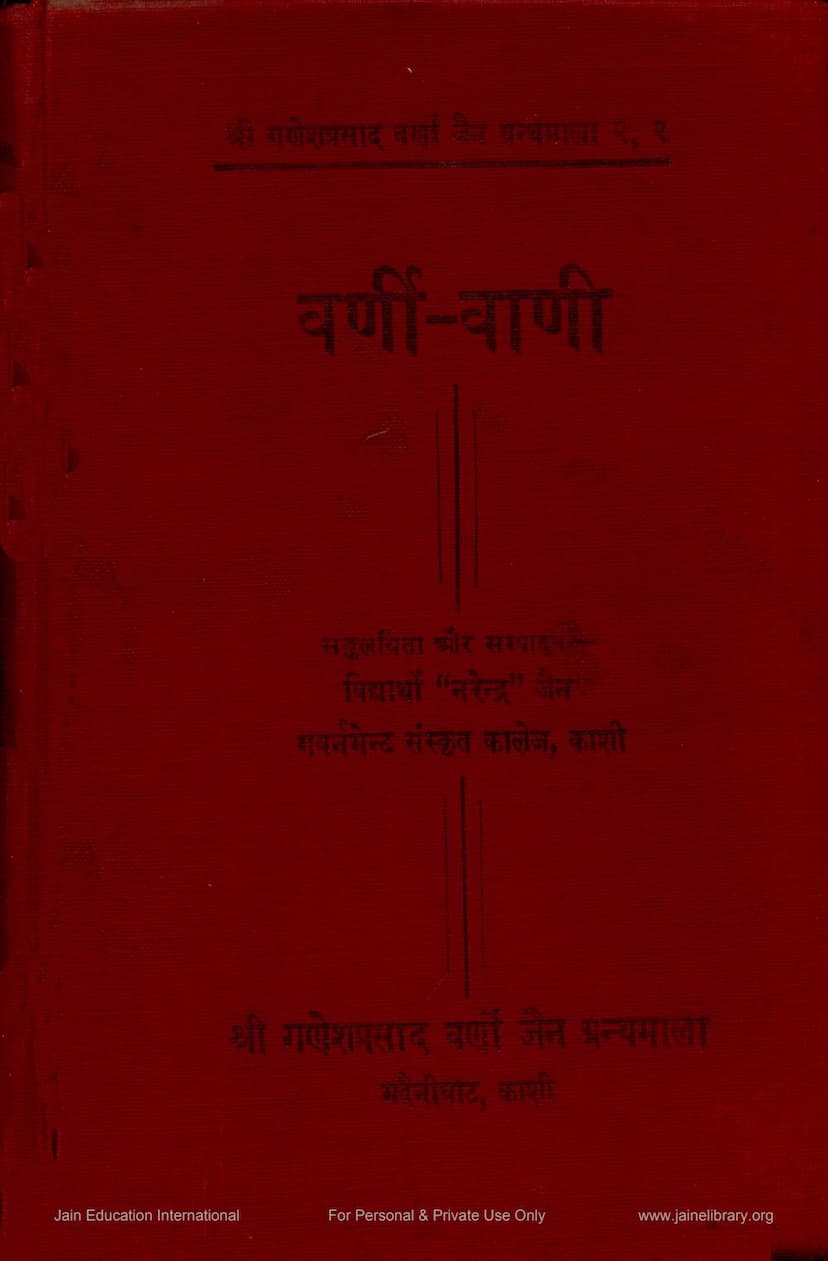Varni Vani
Added to library: September 2, 2025

Summary
This document is the second, expanded and revised edition of "Varni Vani" (The Voice of Varni), compiled and edited by Narendra Jain. It is a collection of the teachings, writings, letters, and speeches of the revered Jain ascetic, Shri Ganeshprasad Varni Maharaj.
The book is published by Shri Ganeshprasad Varni Digambar Jain Sansthan, Varanasi. The compiler, Narendra Jain, a student from Banaras Hindu University, has dedicated immense effort to gather and organize this vast collection of Varni Maharaj's literature, much of which was scattered.
Key aspects and content of "Varni Vani":
- Inspiration and Compilation: The work is inspired by the life and teachings of Shri Ganeshprasad Varni Maharaj, a prominent ascetic of his era. The compiler, Narendra Jain, was motivated by his respect and admiration for Varni Maharaj.
- Scope of Content: The second edition is significantly larger than the first, including:
- Varni Maharaj's autobiography ("Meri Jeevan Gatha").
- Articles written by Varni Maharaj.
- Varni Maharaj's diaries from five years.
- Ancient writings of Varni Maharaj spanning 28 years.
- Recollections of speeches given at philosophical and public assemblies in various cities.
- Approximately 700 letters written by Varni Maharaj to his devotees.
- Varni Maharaj's Life and Ideals: The book highlights Varni Maharaj's extraordinary life from childhood, emphasizing his virtues as a saint and his role as a pioneer. His teachings are presented as a valuable resource for spiritual and personal growth, aiming to guide readers towards self-improvement and a meaningful life.
- Philosophical Context: The preface by Phoolchand Siddhantshastri provides a broader philosophical context, discussing the conflict between materialism and theism in contemporary society and advocating for spirituality (Adhyatmavada) as the true path to lasting peace and well-being. It delves into the foundational principles of Jain philosophy, as laid down by Bhagwan Rishabhdev, emphasizing self-reliance, equality, and the importance of controlling desires.
- Key Themes and Teachings: The collection covers a wide range of spiritual and ethical topics, presented in concise, impactful aphorisms and discourses. These include:
- Kalyan ka Marg (The Path to Welfare): Emphasizing renunciation of afflictive actions, self-realization, and detachment.
- Atma Shakti (Self-Power): Highlighting the immense potential within the soul.
- Atma Nirmalta (Inner Purity): Stressing the importance of mental and spiritual purification over external rituals.
- Atma Vishwas (Self-Confidence): The crucial role of believing in one's own spiritual strength.
- Moksha Marg (The Path to Liberation): Detailing the steps towards spiritual freedom.
- Ratnatraya (The Three Jewels): Right Faith, Right Knowledge, and Right Conduct.
- Shraddha (Faith): The foundational element for spiritual progress.
- Gyan (Knowledge): Knowledge as a means to liberation, distinguishing true wisdom from mere intellectualism.
- Charitra (Conduct): The practical application of knowledge through righteous behavior and self-control.
- Swadhyay (Self-Study): The importance of studying scriptures for spiritual insight.
- Success Principles: Advice on achieving success through truthfulness, fearlessness, detachment, self-control, and perseverance.
- Sadaachar (Good Conduct): The cornerstone of a civilized and meaningful life.
- Three Strengths (Kayik, Vachnik, Manasik): The importance of physical, verbal, and mental strength.
- Duty: The essence of fulfilling one's responsibilities.
- Effort: The necessity of continuous striving for goals.
- Patience: Its role in overcoming challenges.
- Self-Criticism: The value of introspection.
- Concentration: The key to mental focus.
- Humanity: The core values of human behavior.
- Dharma: The true nature of righteousness as inner purity.
- Happiness: Attaining joy through detachment and inner peace.
- Peace: Finding serenity through detachment and equanimity.
- Bhakti (Devotion): The essence of devotion as inner contemplation and surrender to the true self.
- Self-Reliance: Achieving independence and freedom.
- Self-Realization: The ultimate goal of understanding one's true nature.
- Renunciation: The path to liberation through detachment.
- Charity: Various forms of giving for the welfare of others.
- Contemplation: The importance of mindful reflection.
- The Nature of Karma: Understanding the cycle of actions and their consequences.
- The Nature of Suffering and its Causes: Identifying desires, attachments, and negative emotions as the root of suffering.
- The Path to Liberation: The steps and principles leading to ultimate freedom.
- Inspirational Tone: The book is filled with profound spiritual and ethical guidance, intended to inspire readers to lead a more virtuous and meaningful life.
- Appendices: The book includes a glossary of technical terms used in Jain philosophy and a brief biographical sketch of Varni Maharaj.
In essence, "Varni Vani" is a comprehensive spiritual guide, offering timeless wisdom from a revered Jain sage, aimed at fostering inner peace, ethical living, and ultimate spiritual liberation.